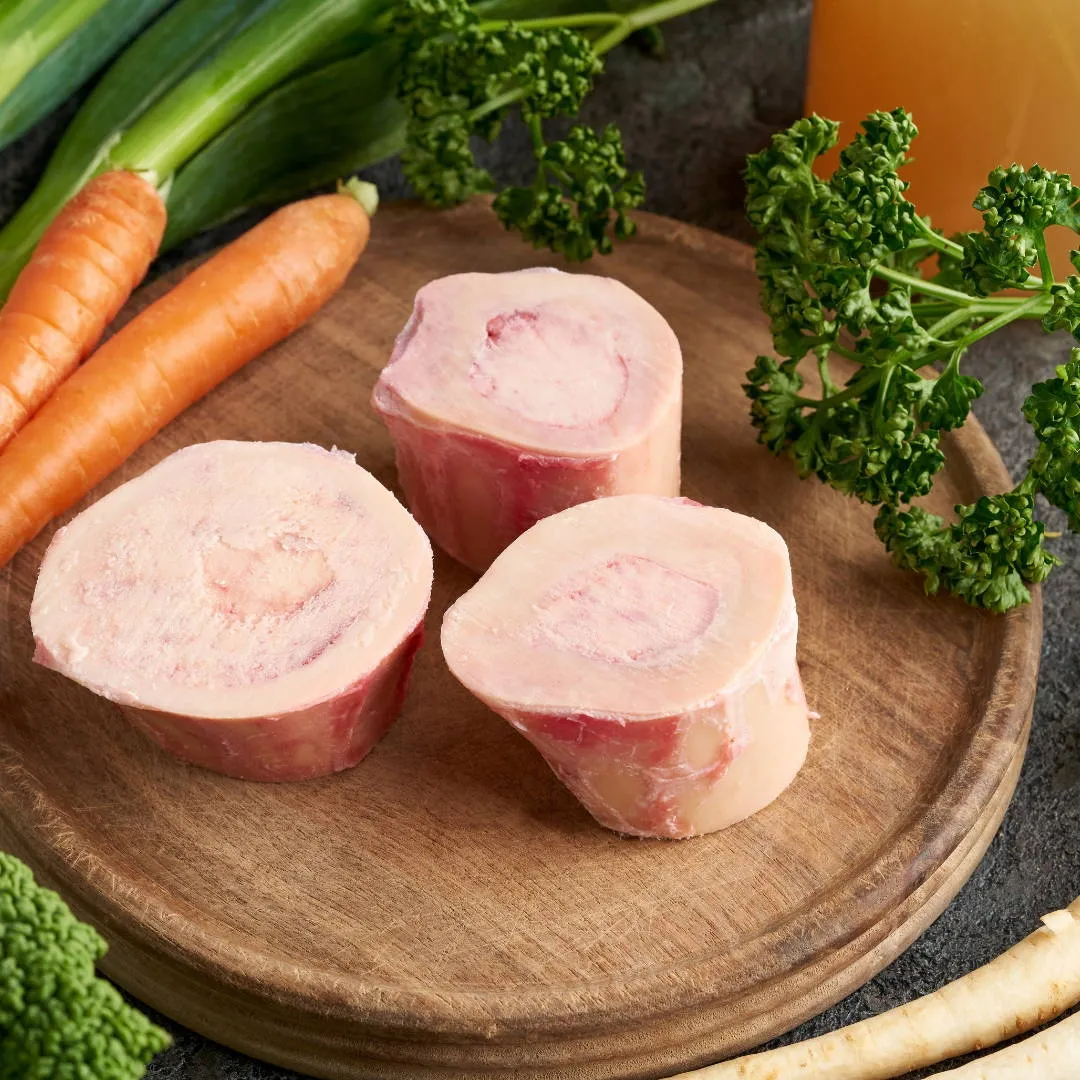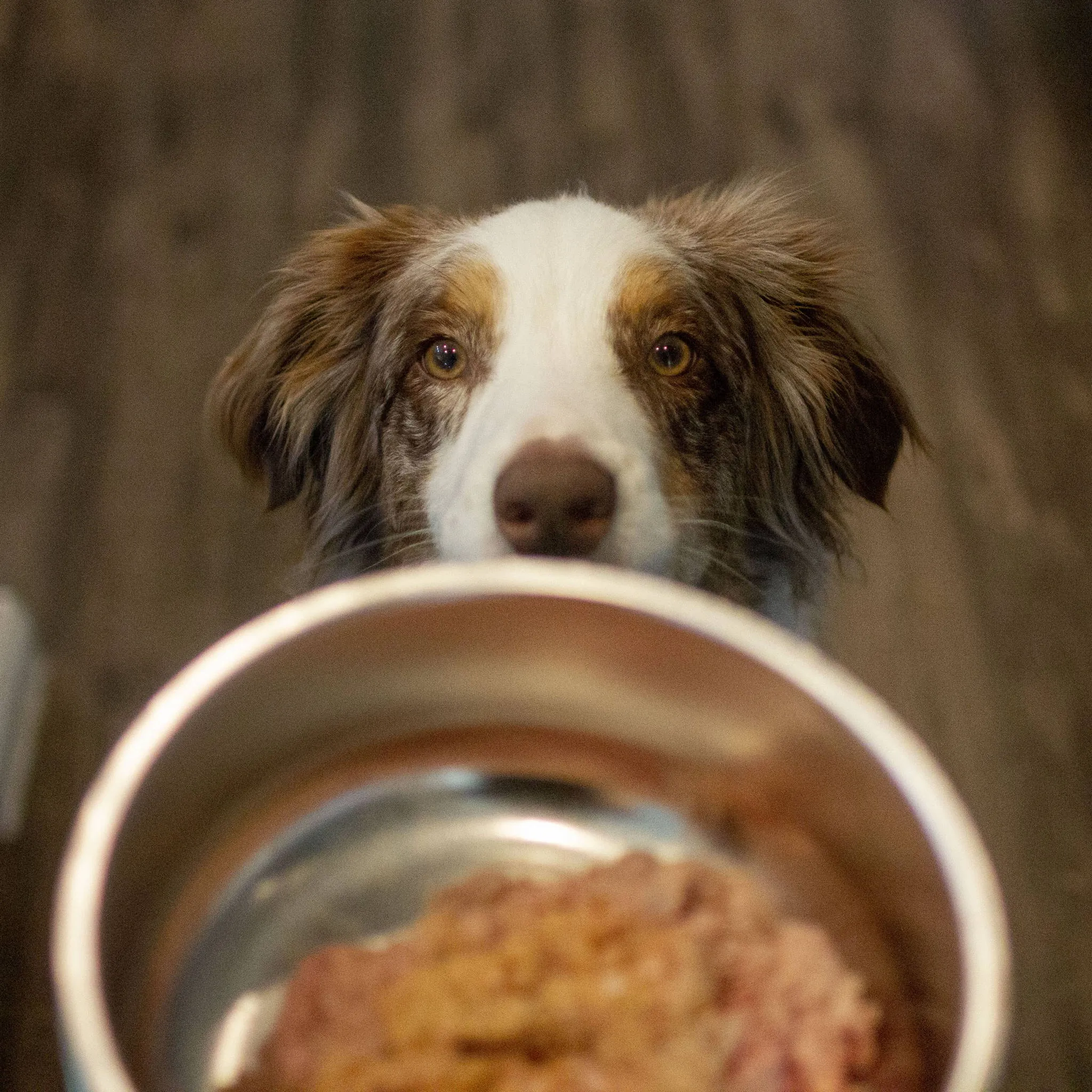Few things are as satisfying and nourishing as a homemade meal, whether we’re cooking for ourselves or our beloved canine companions. In recent years, bone broth has gained significant popularity for both humans and dogs, but its health benefits are far from a new discovery; people have been utilizing its restorative properties for thousands of years across various cultures. When prepared correctly, chicken bone broth for dogs can be a highly nutritious addition to your furry friend’s diet, offering a wealth of essential nutrients and potentially enhancing their overall well-being.
Chicken bone broth for dogs is particularly beneficial because it supports gut and digestive health, boosts the immune system, aids in liver detoxification, and strengthens joints. Common ingredients often found in a wholesome chicken bone broth include raw chicken bones (such as necks, backs, and feet), anti-inflammatory turmeric, select dog-safe herbs, apple cider vinegar, and nutrient-rich vegetables like celery and carrots. Adding a high-quality food like NOW dog food alongside nutrient-dense broth can provide a comprehensive dietary approach.
In this comprehensive guide, we’ll delve into a delicious and wholesome Chicken Bone Broth For Dogs Recipe, focusing on high-quality ingredients and special considerations to ensure your pup’s health and happiness. You’ll learn the difference between broth and stock, uncover the myriad health benefits of this golden liquid, and get step-by-step instructions to prepare it safely at home.
What is Bone Broth?
Bone broth is a rich, nutritious, and hearty liquid created by simmering raw animal bones, often including attached ligaments, cartilage, marrow, and tendons, with water, vegetables, and herbs over an extended period. For chicken bone broth, this typically involves using parts like chicken necks, backs, or feet, which are rich in connective tissues. The long, slow-heat process is crucial as it allows essential minerals, collagen, and amino acids to be extracted from the bones and connective tissues, resulting in a nutrient-dense, savory liquid.
Both dogs and humans can enjoy bone broth. However, when making chicken bone broth for dogs, it’s vital to omit ingredients that are toxic or harmful to canines, such as salt, onions, and excessive amounts of certain spices. The goal is to create a pure, beneficial supplement.
Bone Broth Versus Bone Stock
The terms “stock” and “broth” are often used interchangeably, but there’s a key distinction, especially when considering the nutritional density for your dog. While both are cooked using similar ingredients, broth typically simmers for a much longer duration than stock. Generally, bone broth simmers for at least 12 hours and can go up to 48 hours, whereas stock only simmers for a few hours.
Due to these significantly longer cooking times, bone broth becomes far richer, heartier, and more flavorful than stock. This extended simmering allows for a greater extraction of collagen, gelatin, amino acids, and minerals from the bones, making it significantly more attractive and nutritious for both dogs and humans. For maximum benefits for your dog, aim for a true, slow-simmered bone broth.
Why Chicken Bone Broth for Dogs?
Choosing chicken bones for your dog’s broth offers several advantages. Chicken bones are generally more accessible and often more affordable than beef marrow bones. Chicken necks, backs, and feet are particularly excellent choices as they are packed with cartilage, ligaments, and tendons, which are rich sources of collagen and gelatin. These components are vital for joint health and gut support. The milder flavor of chicken bone broth can also be appealing to picky eaters, making it an ideal choice for regular dietary supplementation.
7 Benefits of Chicken Bone Broth for Dogs
Incorporating homemade chicken bone broth into your dog’s diet can unlock a range of impressive health benefits, supporting various bodily functions.
 Raw marrow bones on circular wooden tray with carrots and parsley.
Raw marrow bones on circular wooden tray with carrots and parsley.
1. Improves Gut and Digestive Health
Chicken bone broth is a powerhouse for gut health, thanks to compounds like collagen, glutamine, gelatin, and glycine:
- Collagen and Gelatin: The slow-cooking process of chicken bones releases collagen and breaks it down into gelatin. These are primarily responsible for supporting connective tissues, bones, and ligaments. In the digestive tract, they work to soothe inflammation and strengthen the gut lining.
- Glycine and Glutamine: Chicken bone broth is rich in two critical amino acids for gut health: glycine and glutamine. Glycine helps protect intestinal mucus against stress and can lower stomach acid levels. Glutamine plays a vital role in strengthening the stomach lining and connective tissues.
Many dogs, unfortunately, suffer from “leaky gut” syndrome, often triggered by stressors, poor diet, trauma, or other health issues. A weakened gut barrier allows unwanted toxins and bacteria to pass into the bloodstream. The gelatin in chicken bone broth is exceptional for dogs with leaky gut syndrome, as it strengthens the gut barrier and reduces inflammation, enabling beneficial nutrients to be absorbed while keeping harmful toxins out. Ultimately, incorporating chicken bone broth into your dog’s diet can ease intestinal irritation, strengthen the gut lining, and reduce stomach acidity, leading to better overall digestive function.
2. Enhances Immunity
The amino acids found abundantly in chicken bone broth are crucial for optimal immune function. Proline, an antiviral amino acid present in bone broth, “plays important roles in protein synthesis and structure, metabolism… and nutrition, as well as wound healing, antioxidative reactions, and immune responses” (source). Furthermore, glycine, another key amino acid, “has a broad spectrum of anti-inflammatory, cytoprotective, and immunomodulatory properties” (source). These combined properties make chicken bone broth an excellent supplement for boosting immunity and supporting a healthy gastrointestinal tract. Regularly feeding chicken bone broth can reduce the likelihood of severe illness by strengthening the immune system and can also aid a sick dog or puppy in fighting off illness and recovering more quickly. You might consider adding this alongside a nutrient-rich meal like ButterBox dog food for comprehensive wellness.
 Thick bone broth in wooden spoon over glass mason jar of broth.
Thick bone broth in wooden spoon over glass mason jar of broth.
3. Strengthens and Repairs Joints, Muscles, and Bones
Chicken bone broth contains essential amino acids, proteins, and glycosaminoglycans (GAGs) that are fundamental for strong bones and healthy joints. Glucosamine, chondroitin, and hyaluronic acid are GAGs found in chicken bone broth that naturally boost collagen production in the body and support the repair and growth of connective tissues.
The high protein content, primarily from collagen, in chicken bone broth is vital for maintaining your dog’s bone structures. Collagen is “the major constituent of bone mass. Results from rodent studies have demonstrated that collagen peptides significantly increase the organic substance of the bone” (source). As pets age, joint degeneration is common. Incorporating chicken bone broth into their diet can help maintain the cushioning between bones, promoting graceful aging. Many senior dogs, especially those on specific diets like Blue Buffalo senior dog food, can benefit greatly from this joint support. The joint-supporting nutrients in chicken bone broth can increase your dog’s mobility, lubricate their joints, and keep their bones strong and flexible.
 A yellow dog Lula panting, running, and looking to the right on green grass.
A yellow dog Lula panting, running, and looking to the right on green grass.
4. Filters Bodily Toxins
Despite our best efforts, most dogs will occasionally eat something they shouldn’t. In such instances, a well-functioning liver is crucial for purifying toxins from the body and preventing serious illness. Our environment is also unfortunately filled with toxins—from the air to the water—which dogs are exposed to daily. Supplemental dietary nutrients can significantly aid in detoxification, and this is where chicken bone broth shines.
One cup of bone broth typically contains about 0.5 to 1.7 grams of glycine, an essential amino acid. Glycine performs numerous functions in the body, including vital detoxification processes. Research indicates that glycine “improves survival rate and liver function by controlling the production of pro-inflammatory or anti-inflammatory cytokines in the endotoxin-induced liver injury mouse model” (source). This makes chicken bone broth a powerful tool in supporting your dog’s natural detoxification pathways.
5. Boosts Hydration and Helps Picky Eaters
Maintaining proper hydration is critical for your dog’s health under all circumstances. Water is essential for nearly every bodily function, from energy regulation to body temperature control and recovery from illness. While a raw dog food diet naturally contains more intracellular moisture to keep pets hydrated, if you feed a freeze-dried or kibble diet, adding moisture to their bowl with water or chicken bone broth is essential.
Adding chicken bone broth to your pet’s food not only makes the meal more appealing with its savory taste but also significantly boosts their hydration due to its high water content. Furthermore, having chicken bone broth on hand is an excellent strategy if your pup experiences an upset stomach, diarrhea, or vomiting. Its ability to reduce gut inflammation and provide critical hydration makes it a powerful aid for recovery from illness. For dogs that are feeling under the weather, knowing what can you feed your dog when they are sick is essential, and bone broth is often a top recommendation.
 Dog behind silver bowl with raw food inside.
Dog behind silver bowl with raw food inside.
6. Promotes Skin and Coat Health
As dogs age, their body’s natural collagen production begins to slow down. This decline has various negative impacts, including a less youthful appearance and a duller coat. Collagen and glycosaminoglycans (GAGs), both abundantly found in chicken bone broth, are known to improve skin moisture and elasticity, leading to shinier, healthier skin and a more vibrant coat. By incorporating collagen-rich chicken bone broth into your dog’s diet, you can help stimulate collagen production, reduce bodily inflammation, and properly hydrate their system, all contributing to a lustrous coat and supple skin.
7. Provides Sleep Support
The amino acid glycine, prominently featured in chicken bone broth, is known to elevate serotonin levels and is excellent for enhancing sleep quality. In fact, studies show that “glycine ingestion before bedtime significantly ameliorated subjective sleep quality in individuals with insomniac tendencies…The decline in the core body temperature might be a mechanism underlying glycine’s effect on sleep, as the onset of sleep is known to involve a decrease in the core body temperature” (source). Some dogs, especially as they age, may experience nighttime anxiety, interrupted sleep, or even insomnia. Including glycine-rich foods like chicken bone broth in their diet can be a natural way to help improve sleep quality for elderly pets, providing similar comfort to how some might research dog food advisor best wet food to find the most digestible options for their aging companions.
Common Ingredients in Chicken Bone Broth for Dogs (Plus Benefits)
While every chicken bone broth recipe for dogs may vary slightly, there are several common ingredients you’ll want to consider for their unique benefits:
- Raw Chicken Bones: The foundation of your broth. Raw chicken bones like necks, backs, feet, and wing tips are excellent choices. They are rich in essential minerals such as calcium, phosphorus, and magnesium. Crucially, they contain vital collagen and connective tissues that break down into gelatin, which significantly improves joint health, skin health, and gut integrity.
- Turmeric: This vibrant yellow spice is highly valued for its potent antioxidant and anti-inflammatory properties. The active compound in turmeric, curcumin, can help reduce joint pain, promote a healthy coat, and support overall immune function in dogs.
- Garlic (Optional): When used in appropriate, small quantities, fresh garlic can offer several health benefits for dogs. It contains allicin, a compound recognized for its antimicrobial, detoxifying, and immune-boosting properties. Contrary to common misconceptions, fresh garlic, when correctly dosed, can be healthy for most dogs (consult your holistic veterinarian for guidance, or refer to resources like Dogs Naturally Magazine on Can Dogs Eat Garlic?).
- Apple Cider Vinegar (ACV): Organic, unfiltered, and raw apple cider vinegar is highly beneficial for dogs. ACV can help regulate blood sugar, improve heart health, manage yeast infections due to its antimicrobial properties, and reduce inflammation. It also contains natural probiotics, which are excellent for gut health and digestion. An acidic ingredient like ACV is vital in bone broth to help pull nutritious minerals from the bones.
- Celery: Celery is a good source of fiber and vitamins C, K, and A, along with folate, manganese, and potassium. Eaten in moderation, it aids digestion and can boost mobility.
- Carrots: Carrots are loaded with antioxidants like vitamin C, which helps reduce oxidative stress. The beta-carotene in carrots converts into vitamin A in the body, which is essential for strengthening the eyes, improving skin and coat health, and maintaining strong bones.
- Fresh Herbs: You can add a variety of dog-safe herbs like basil, thyme, parsley, and cilantro to your chicken bone broth for added flavor and nutrients.
- Basil is linked to digestive health and immunity.
- Parsley is rich in minerals and vitamins (A, C, K), has antifungal properties, and can help flush harmful bacteria from the urinary tract.
- In small quantities, thyme offers antiseptic and antibacterial properties and is packed with manganese, potassium, iron, and various vitamins.
- Cilantro contains calcium, vitamins K and C, and magnesium, supporting bones, eyes, and immunity.
How to Safely Feed Chicken Bone Broth to Your Dog
Chicken bone broth is incredibly versatile and can be served in various ways: as a wholesome treat, mixed into your dog’s regular meals, or used to rehydrate dry kibble or freeze-dried food.
When introducing any new food item, including chicken bone broth, it’s always recommended to start gradually. Begin with a small amount and closely monitor your dog for any adverse reactions, such as digestive upset. If your dog has a sensitive stomach, initially giving them too much bone broth can lead to gastrointestinal issues.
Safety Tip: Never feed your dog the cooked bones from your homemade chicken bone broth. Always strain the broth thoroughly before serving. Cooked bones become brittle and can splinter easily, posing a significant risk of injury to your dog’s mouth, throat, or intestines.
Can Dogs Eat Chicken Bone Broth Every Day?
Yes, dogs can safely eat chicken bone broth every day as part of their meals or as a treat. It’s important to remember that bone broth is a supplemental food and should not replace a well-rounded, complete, and balanced diet. It does not provide every single vitamin, mineral, or nutrient your dog needs to thrive as a primary food source.
How Much Chicken Bone Broth Can I Give My Dog?
As a general guideline, you can give your dog approximately 1 ounce of chicken bone broth for every 15 pounds of their body weight. So, for instance, if you have a medium-sized 45-pound dog, you can safely offer them around 3 ounces of chicken bone broth daily. Always adjust based on your dog’s individual needs, activity level, and overall diet, and consult your veterinarian if you have concerns.
Storing Homemade Chicken Bone Broth
Once you’ve made your delicious homemade chicken bone broth, proper storage is key to maintaining its freshness and extending its shelf life. You can store the broth in an airtight container in the refrigerator for up to a week. For longer storage, chicken bone broth freezes exceptionally well and can last for up to a year in the freezer.
Consider portioning your chicken bone broth into ice cube trays before freezing. This allows you to easily thaw individual servings as needed. Simply move the desired number of frozen cubes to the refrigerator to dethaw and serve in convenient batches.
Tips: Choosing a Store-Bought Bone Broth
If making your own chicken bone broth isn’t feasible, you can certainly purchase dog-safe bone broth from the store. However, it’s crucial to be selective:
- Check the Ingredients Carefully: Many bone broths formulated for human consumption are not safe for dogs. They often contain high levels of sodium, which is detrimental to canine health, and may include toxic ingredients like onions or xylitol. Always opt for a bone broth specifically designed and labeled for pets to ensure it’s free from harmful additives.
- Look for Quality: High-quality store-bought broths are genuinely crafted from actual animal bones, not from flavorings or other fillers. The best products will list “chicken bones” or another specific type of bone as the primary ingredient (besides water). Be wary of products that list “natural flavors,” as these can often be synthetic or mask undesirable ingredients.
You can typically find dog-safe broth in liquid form (available refrigerated, frozen, or shelf-stable) or as a dehydrated powder, offering convenient options to suit your preferences.
DIY Chicken Bone Broth for Dogs Recipe
Making your own chicken bone broth for dogs is a rewarding process, ensuring you have complete control over the quality and safety of the ingredients.
 Bone broth for dogs ingredients listed with amounts.
Bone broth for dogs ingredients listed with amounts.
Ingredients
- 2-3 pounds of raw chicken bones (such as backs, necks, feet, or wing tips). Using a variety adds depth and nutrient richness.
- 2 quarts of purified water (or enough to fully cover the bones by 2-3 inches)
- 1 teaspoon of turmeric powder
- 1 stalk of celery, roughly chopped
- 1 medium-sized carrot, roughly chopped
- 2-3 tablespoons of apple cider vinegar (organic, unfiltered, raw is best) or lemon juice (See Note 1)
- 1 small clove of garlic, minced (optional—always consult with your holistic veterinarian if you are concerned about adding garlic to your dog’s diet)
- Additional fresh, dog-safe herbs as desired: cilantro, basil, thyme, parsley, oregano, or sage
Note 1: An acidic ingredient like apple cider vinegar or lemon juice is vital as it helps draw out nutritious minerals and collagen from the chicken bones during the simmering process.
Note 2: Always source the best quality ingredients you can find for optimal results. Follow proper cooking guidelines and consult with your holistic veterinarian to ensure the best results and safety for your furry friend, especially when introducing new foods or supplements.
Stovetop Recipe Instructions
- Prepare Bones: Place the raw chicken bones in a large, heavy-bottomed stovetop pot.
- Add Liquid & Acid: Cover the bones entirely with filtered water, ensuring they are submerged by at least 2-3 inches. Add the apple cider vinegar or lemon juice.
- Add Flavor & Nutrients: Incorporate the turmeric, chopped celery, chopped carrot, optional minced garlic, and any desired fresh herbs into the pot. These ingredients will enhance the flavor and provide additional nutrients for your dog.
- Bring to a Boil, then Simmer: First, bring the mixture to a rolling boil over high heat. Once boiling, immediately reduce the heat to the lowest setting to maintain a gentle simmer.
- Long Simmer: Allow the broth to simmer on low heat for a minimum of 12 hours, ideally 24 hours. The longer the simmer (up to 48 hours), the more nutrients will be extracted, and the richer the broth will become. Skim off any foam or scum that rises to the surface during the first few hours of simmering.
- Cooling Down: After the broth has finished cooking, remove it from the heat and let it cool down to room temperature. This step is essential as it allows the flavors to meld further and ensures easy removal of excess fat that will solidify at the top.
- Strain and Skim: The next day, after refrigerating overnight, take the cooled broth out of the refrigerator. Using a fine-mesh strainer or cheesecloth, separate all solid ingredients from the liquid broth, ensuring a smooth and clear liquid. Discard all solids, especially the cooked bones (never feed cooked bones to dogs). Skim off the solidified fat layer from the surface of the broth. This step helps reduce the fat content, making it more suitable for your dog’s diet.
- Store: Divide the finished chicken bone broth into small, airtight containers or ice cube trays and store them in the refrigerator or freezer as desired.
Crockpot or Slow Cooker Recipe Instructions
- Prepare Bones: Place the raw chicken bones in your crockpot or slow cooker.
- Add Liquid & Acid: Cover the bones entirely with filtered water. Add the apple cider vinegar or lemon juice.
- Add Flavor & Nutrients: Add the turmeric, chopped celery, chopped carrot, optional minced garlic, and any desired fresh herbs to the pot.
- Initial Cook: First, cook the broth on the “high” setting for 1-2 hours. This helps kickstart the extraction process.
- Long Simmer: Reduce the heat to the “low” setting and continue to cook the broth for an additional 12-24 hours. Cooking for 24 hours is ideal, but you can even extend this up to 48 hours for maximum nutrient extraction and flavor.
- Cooling Down: Once the broth has finished cooking, turn off the slow cooker and let it cool down to room temperature. This allows flavors to deepen and facilitates easier fat removal.
- Strain and Skim: The next day, after refrigerating overnight, retrieve the cooled broth. Using a fine-mesh strainer or cheesecloth, meticulously separate all solid ingredients from the liquid broth. Ensure all solids, particularly the cooked chicken bones, are discarded (they are dangerous for dogs). Carefully skim off the solidified fat layer from the broth’s surface.
- Store: Portion the finished chicken bone broth into small, airtight containers or ice cube trays for convenient storage in the refrigerator or freezer.
Frequently Asked Questions
Can I give my dog bone broth from the grocery store?
Most bone broths found in regular grocery stores are made for human consumption and are generally not suitable for dogs. They often contain ingredients that are toxic to dogs, such as onions, or dangerously high levels of sodium. It’s always safest to opt for a bone broth specifically formulated and marketed for pets, or even better, make your own homemade chicken bone broth for dogs.
Is chicken bone broth good for dogs or not?
Yes, chicken bone broth is incredibly good for dogs! It offers numerous health benefits, including supporting gut and digestion, providing essential hydration, strengthening joints, and enhancing immune function. It can be a wonderful supplement to your dog’s diet, either added to their mealtime or served as a nutritious treat.
What kind of chicken bones are best for chicken bone broth for dogs?
For the best chicken bone broth for dogs, focus on bones rich in connective tissue, cartilage, and marrow. Excellent choices include chicken necks, chicken backs, chicken feet, and wing tips. These parts break down well during long simmering, releasing maximum collagen and gelatin, which are key for the broth’s health benefits.
How long does homemade chicken bone broth last?
Homemade chicken bone broth can be stored in an airtight container in the refrigerator for up to 7 days. For longer storage, it can be safely kept in the freezer for up to 6 to 12 months. Freezing in individual portions, like ice cubes, is a convenient way to extend its shelf life and ensure you always have some on hand.
